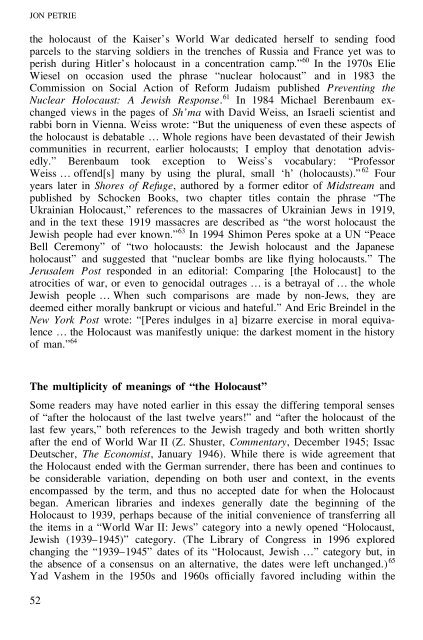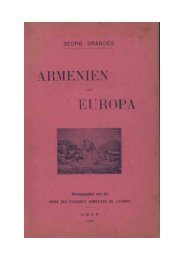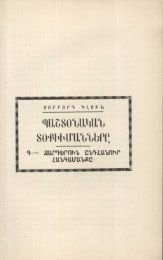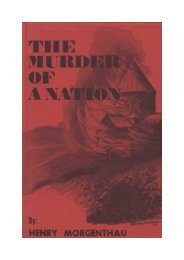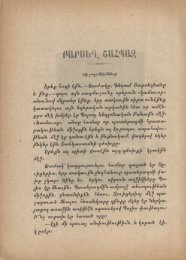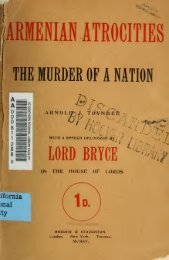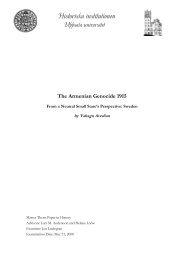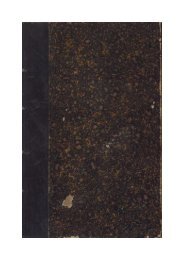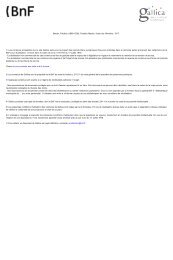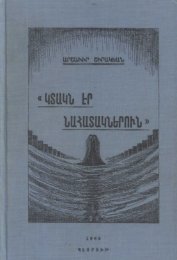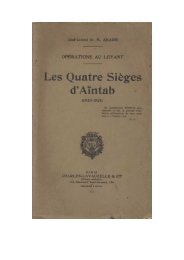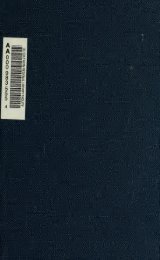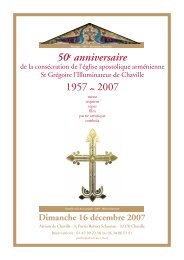The secular word HOLOCAUST: scholarly myths, history, and 20th ...
The secular word HOLOCAUST: scholarly myths, history, and 20th ...
The secular word HOLOCAUST: scholarly myths, history, and 20th ...
You also want an ePaper? Increase the reach of your titles
YUMPU automatically turns print PDFs into web optimized ePapers that Google loves.
JON PETRIEthe holocaust of the Kaiser’s World War dedicated herself to sending foodparcels to the starving soldiers in the trenches of Russia <strong>and</strong> France yet was toperish during Hitler’s holocaust in a concentration camp.” 60 In the 1970s ElieWiesel on occasion used the phrase “nuclear holocaust” <strong>and</strong> in 1983 theCommission on Social Action of Reform Judaism published Preventing theNuclear Holocaust: A Jewish Response. 61 In 1984 Michael Berenbaum exchangedviews in the pages of Sh’ma with David Weiss, an Israeli scientist <strong>and</strong>rabbi born in Vienna. Weiss wrote: “But the uniqueness of even these aspects ofthe holocaust is debatable … Whole regions have been devastated of their Jewishcommunities in recurrent, earlier holocausts; I employ that denotation advisedly.”Berenbaum took exception to Weiss’s vocabulary: “ProfessorWeiss … offend[s] many by using the plural, small ‘h’ (holocausts).” 62 Fouryears later in Shores of Refuge, authored by a former editor of Midstream <strong>and</strong>published by Schocken Books, two chapter titles contain the phrase “<strong>The</strong>Ukrainian Holocaust,” references to the massacres of Ukrainian Jews in 1919,<strong>and</strong> in the text these 1919 massacres are described as “the worst holocaust theJewish people had ever known.” 63 In 1994 Shimon Peres spoke at a UN “PeaceBell Ceremony” of “two holocausts: the Jewish holocaust <strong>and</strong> the Japaneseholocaust” <strong>and</strong> suggested that “nuclear bombs are like ying holocausts.” <strong>The</strong>Jerusalem Post responded in an editorial: Comparing [the Holocaust] to theatrocities of war, or even to genocidal outrages … is a betrayal of … the wholeJewish people … When such comparisons are made by non-Jews, they aredeemed either morally bankrupt or vicious <strong>and</strong> hateful.” And Eric Breindel in theNew York Post wrote: “[Peres indulges in a] bizarre exercise in moral equivalence… the Holocaust was manifestly unique: the darkest moment in the <strong>history</strong>of man.” 64<strong>The</strong> multiplicity of meanings of “the Holocaust”Some readers may have noted earlier in this essay the differing temporal sensesof “after the holocaust of the last twelve years!” <strong>and</strong> “after the holocaust of thelast few years,” both references to the Jewish tragedy <strong>and</strong> both written shortlyafter the end of World War II (Z. Shuster, Commentary, December 1945; IssacDeutscher, <strong>The</strong> Economist, January 1946). While there is wide agreement thatthe Holocaust ended with the German surrender, there has been <strong>and</strong> continues tobe considerable variation, depending on both user <strong>and</strong> context, in the eventsencompassed by the term, <strong>and</strong> thus no accepted date for when the Holocaustbegan. American libraries <strong>and</strong> indexes generally date the beginning of theHolocaust to 1939, perhaps because of the initial convenience of transferring allthe items in a “World War II: Jews” category into a newly opened “Holocaust,Jewish (1939–1945)” category. (<strong>The</strong> Library of Congress in 1996 exploredchanging the “1939–1945” dates of its “Holocaust, Jewish …” category but, inthe absence of a consensus on an alternative, the dates were left unchanged.) 65Yad Vashem in the 1950s <strong>and</strong> 1960s of cially favored including within the52


